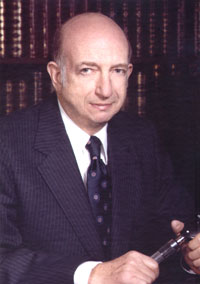News and Events
News Brief
NEI Mourns Arnall Patz

Arnall Patz, M.D.
Arnall Patz, M.D., renowned vision researcher and emeritus professor of ophthalmology at the Wilmer Eye Institute at the Johns Hopkins University, died of heart disease on Thursday, March 11. He was 89.
"We have lost one of the great pioneers of ophthalmic research," said Paul A. Sieving, M.D., Ph.D., director of the National Eye Institute (NEI).
Dr. Patz earned his medical degree from Emory University, served as an army doctor at the Walter Reed Army Medical Center, and trained at D.C. General Hospital in the nation's capital. He also earned a Master of Liberal Arts degree from the Johns Hopkins Krieger School of Arts and Sciences when he was 78.
Dr. Patz became a part-time member of the Johns Hopkins faculty in 1955 while maintaining a private ophthalmology practice, and transitioned to a full-time research professor in 1970. In 1979, he became the director of the Wilmer Eye Institute, a position he held for 10 years.
As a young ophthalmology resident in the early 1950s, Dr. Patz conducted what is now considered to be one of the first randomized clinical trials, not just in ophthalmology but in all of medicine. His small study revealed that excess oxygen given to premature babies resulted in a disease called retrolental fibroplasia (RLF, more commonly known as retinopathy of prematurity), a major cause of blindness in children at that time. Promising initial results led to a larger randomized clinical trial supported by the National Institute of Neurological Diseases and Blindness (from which the NEI was born) and organized by V. Everett Kinsey, Ph.D., an ophthalmic biochemist. With the help of ophthalmologists and pediatricians around the country, Drs. Patz and Kinsey confirmed that high concentrations of oxygen administered to premature infants in incubators did cause the disease. Consequently, physicians reduced the levels of oxygen given to premature infants, and the incidence of RLF dropped dramatically.
"Arnall Patz was one of the most influential people in my career," said NEI clinical director Frederick L. Ferris III, M.D. "He ran the first clinical trial in ophthalmology, and his help and support was critical to the eventual success of the clinical trials program at the NEI."
For their work, Drs. Patz and Kinsey received the prestigious Albert Lasker Award for Clinical Medical Research in 1956. After more than 50 years in medicine, Dr. Patz also received the 2004 Presidential Medal of Freedom from President George W. Bush, who praised him as "the man who has given to uncounted men, women and children the gift of sight."
March 18, 2010

